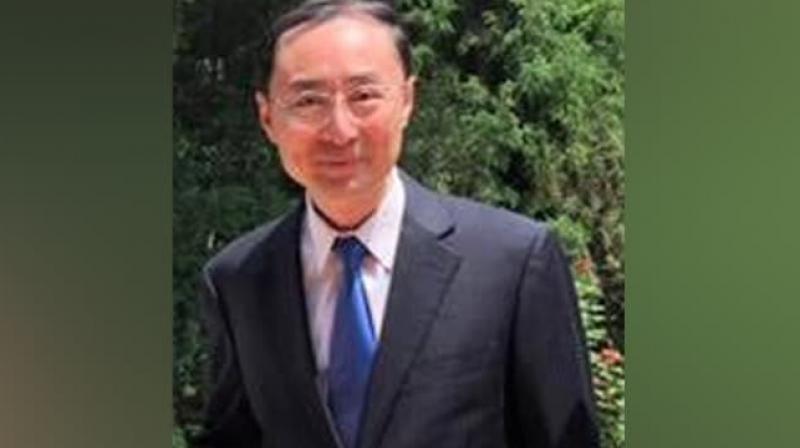In apparent reference to PoK, China\'s new envoy appeals to India: report
Officials say talks are on for Xi Jinping\'s visit to India which is expected to take place in October this year.

Beijing: As Chinese President Xi Jinping is set to visit India later this year for his second informal summit with Prime Minister Narendra Modi, China has said the two neighbours should not allow any "individual case" to disrupt the bilateral relations and take more initiatives to move forward the bilateral ties in a steady and sound way.
China's new Ambassador to India Sun Weidong said that with two strong leaders at the helm in both the countries, the ties are set to reach new heights.
Under the strategic guidance provided by President Xi and Prime Minister Modi at their first informal summit in Wuhan last year, the China-India relations have gathered a "very good and sound momentum of development", Sun told the Indian media in Beijing on Friday as he is set to travel to New Delhi to take over his new assignment.
"This year the two leaders are going to hold another informal meeting. I believe, this will be a top priority in our bilateral relations which will surely take our relations on to new heights," he said.
Officials say talks are on for Xi Jinping's visit to India which is expected to take place in October this year. The talks might be held in Varanasi, they said.
A veteran Chinese diplomat with vast experience in South Asian affairs, Mr Sun till recently served as China's Ambassador to Pakistan, where Beijing is cementing its all-weather ties with Islamabad with the USD 60 billion so-called "China-Pakistan Economic Corridor (CPEC)", which is strongly objected to by India as it passes through Gilgit-Baltistan region of Pakistan-occupied Kashmir or PoK, which is part of Jammu and Kashmir - India's northernmost state.
During his hour-long interaction with the media, Mr Sun focussed on critical bilateral issues like the boundary dispute and the trade gap between India and China which last year crossed USD 57 billion in a USD 95.5 billion total trade.
"We have to do more than managing differences and take more initiatives in shaping our relationship," he said.
However, in an apparent reference to the so-called "China-Pakistan Economic Corridor" or "CPEC", which passes through Pakistan-occupied Kashmir or PoK, Sun said both the countries should not allow "individual cases" to disrupt ties, reported news agency Press Trust of India.
"I think we share enormous potential for cooperation and our shared interests far out way our differences. That is why we need to focus on cooperation, make it a bigger pie and to narrow down the list of our problems and issues and do not allow any individual case at certain time to disrupt our bilateral relations," he said.
Outlining various initiatives taken by India and China including the appointment of Special Representatives in 2003 to address the boundary dispute, Mr Sun said, "I think an early settlement of the boundary issue is in line with the interests of the two countries".
"But before we finally reach a solution to the boundary dispute, we should properly manage our differences to ensure peace and tranquillity in the border areas," Sun said.
National Security Advisor, Ajit Doval and Chinese Foreign Minister Wang Yi are the designated Special Representatives of the boundary disputes.
So far the two countries have held 21 rounds of talks to resolve differences over the 3,488-km long Line of Actual Control.
"We have signed the agreement on the political guidelines for the boundary question and we have also identified the basic principle of a package plan to make mutual adjustment to resolve the boundary issue," he said, referring to the three-step approach agreed by the two countries to work out a settlement.
"A series of consensus were reached under the framework after our in-depth communication," he said.
"As two neighbours and time honoured civilisations, our two countries have sufficient political wisdom to resolve the boundary dispute."
"We hope that we can have equal footed talks to accommodate each other's legitimate concerns so as to find a solution that is fair, rational and acceptable to both sides," he said.
Stating that the "historic" informal summit at Wuhan between Modi and Xi has guided the bilateral ties "back to track of steady and rapid development", Mr Sun said "China attaches great importance to our relationship with India".
"India is also high on our diplomatic agenda," he said.
The Wuhan summit took place after the 71-day standoff between the two militaries at Doklam.
"Now we have 30 dialogue mechanisms covering areas politics, economy, trade, defence people-to-people cooperation, security and sub-national cooperation. China is India's biggest trading partner while India is China's largest trading partner in South Asia," Sun said.
Highlighting his thoughts on promoting the bilateral ties, Sun said "we need to take the important consensus of the two leaders as basic principle to follow".
"It is imperative for us to ensure that the consensus of the two leaders pass down to officials at different levels so that they get a proper sense of its importance," he said.
"We also need to translate it (consensus) into tangible cooperation. By doing so we will be able to build a closer partnership of development and move forward the bilateral relationship in a steady and sound way," he said.

